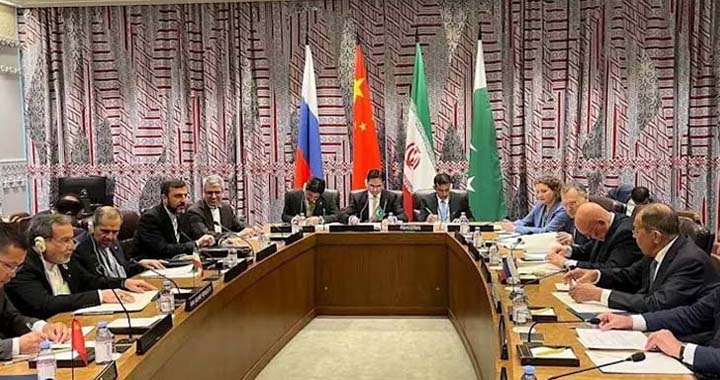According to the Foreign Office spokesperson, the foreign ministers of China, Iran, Pakistan, and Russia held their fourth quadrilateral meeting in New York on the sidelines of the 80th UN General Assembly session. The meeting expressed deep concern over the presence of banned terrorist groups in Afghanistan, including Daesh, Al-Qaeda, Tehrik-e-Taliban Pakistan (TTP), the Balochistan Liberation Army (BLA), and Jaish al-Adl, and called for decisive action against them.
The ministers reaffirmed their commitment to an independent, united, and peaceful Afghanistan. They also emphasized the need to improve Afghanistan’s economy and ease the suffering of its people. The participants stressed enhancing regional connectivity and trade cooperation with Afghanistan, while also calling for adjustments in the 1988 sanctions regime to reflect ground realities. They urged avoiding political bias and double standards regarding travel exemptions for Taliban leaders.
The meeting called for scaling up emergency humanitarian assistance to Afghanistan, stressing that aid should not be linked with political considerations. Afghan authorities were urged to take effective measures against terrorist groups, stop terror financing, recruitment, and access to weapons, and dismantle terrorist training camps and infrastructure inside the country. The ministers also agreed to strengthen bilateral and multilateral cooperation in counterterrorism.
The participants welcomed Afghanistan’s efforts to curb opium cultivation and called for a comprehensive strategy against narcotics. They also emphasized the dignified return of Afghan refugees. Iran and Pakistan’s role in hosting millions of Afghan refugees was appreciated, with a call on the international community to extend greater support.
The ministers stressed the formation of an inclusive and broad-based government in Afghanistan, ensuring women and girls have access to education, employment, and participation in public life. They underscored the importance of safeguarding the fundamental rights and welfare of the Afghan people, while holding NATO countries responsible for the current situation in Afghanistan.
The quadrilateral meeting also demanded the release of Afghanistan’s frozen assets and rejected the establishment of military bases in Afghanistan or its neighboring countries. The participants expressed support for global and regional efforts for a political solution to the Afghan issue.
They also highlighted the importance of the Moscow Format, the Shanghai Cooperation Organization (SCO), and meetings of Afghanistan’s neighboring countries. The recent quadrilateral gathering in Dushanbe was welcomed.





